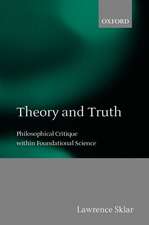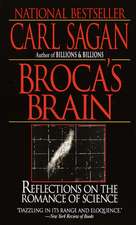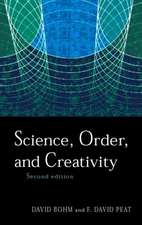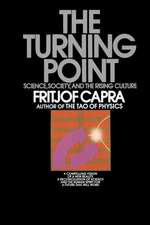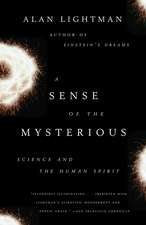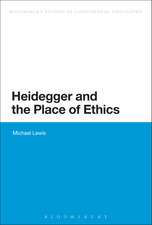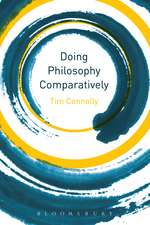Philosophical Chemistry: Genealogy of a Scientific Field
Autor Professor Manuel DeLandaen Limba Engleză Paperback – 16 oct 2019
| Toate formatele și edițiile | Preț | Express |
|---|---|---|
| Paperback (1) | 93.96 lei 22-36 zile | |
| Bloomsbury Publishing – 16 oct 2019 | 93.96 lei 22-36 zile | |
| Hardback (1) | 353.05 lei 22-36 zile | |
| Bloomsbury Publishing – 20 mai 2015 | 353.05 lei 22-36 zile |
Preț: 93.96 lei
Preț vechi: 163.20 lei
-42% Nou
Puncte Express: 141
Preț estimativ în valută:
17.98€ • 19.54$ • 15.12£
17.98€ • 19.54$ • 15.12£
Carte disponibilă
Livrare economică 31 martie-14 aprilie
Preluare comenzi: 021 569.72.76
Specificații
ISBN-13: 9781474286404
ISBN-10: 1474286402
Pagini: 248
Dimensiuni: 129 x 198 x 24 mm
Greutate: 0.3 kg
Editura: Bloomsbury Publishing
Colecția Bloomsbury Academic
Locul publicării:London, United Kingdom
ISBN-10: 1474286402
Pagini: 248
Dimensiuni: 129 x 198 x 24 mm
Greutate: 0.3 kg
Editura: Bloomsbury Publishing
Colecția Bloomsbury Academic
Locul publicării:London, United Kingdom
Caracteristici
The strategy followed uses a series of chemical textbooks, separated from each other by fifty year periods (1750, 1800, 1850, and 1900), to follow the historical formation of consensus practices
Notă biografică
Manuel DeLanda is a distinguished writer, artist and philosopher. He began his career in experimental film, later becoming a computer artist and programmer. He is now Professor of Philosophy in the Department of Architecture at the University of Pennsylvania, USA.
Cuprins
Introduction.Chapter One: Classical Chemistry.A Multiplicity of Cognitive Tools.From Personal to Consensus Practice: 1700-1800.Chapter Two: Organic Chemistry.The Specialization of Cognitive Tools.From Personal to Consensus Practice: 1800-1900.Chapter Three: Physical Chemistry.The Hybridization of Cognitive Tools.From Personal to Consensus Practice: 1800-1900.Chapter Four: Social Chemistry.Conventions, Boundaries, and Authority.BibliographyIndex
Recenzii
[This] book presents a problem-focused intellectual history of chemistry ... with extraordinary conceptual clarity.
Even as a long-time reader of DeLanda's work, I'm struck by the richness and depth of his Philosophical Chemistry. His characteristic clarity and rigor are there, as he relentlessly and patiently traces the shifting population of concepts, methods, and phenomena of chemistry's history. In showing the progressive determinations of the virtual idea of chemistry in its successive individuations across its succeeding generations, DeLanda has given us nothing less than a Deleuzean take on Foucault's Archeology of Knowledge.
For more than two decades, Manuel DeLanda has been one of the most challenging philosophers in our midst: a self-taught lone wolf whose sphere of influence ranges from military academies to architecture schools to opium dens. In this new book, he gives us a guided tour through more than two hundred years of the history of chemistry, leading us to a new philosophy of science that contests the unspoken Kuhnian standpoint of most continentally trained philosophers.
This book by a distinguished philosopher is an attempt to give a philosophical underpinning to chemistry. In four short but dense chapters, each drawing on a textbook of a given period, DeLanda (European Graduate School, Switzerland) discusses his theories of the philosophy of chemistry with respect to 18th-century inorganic chemistry, 19th-century organic chemistry, 19th-century physical chemistry, and what he terms 'social chemistry.' The overall intent is to present an intellectual history of chemistry during the periods described. The author's command of the field is impressive, though there are occasional lapses in chemical understanding. The text covers only 158 pages, and there are over 60 pages of references, many with extensive comments. There are separate author and subject indexes, but no illustrations. A book for serious philosophers and historians of science, not general readers. Summing Up: Recommended. Researchers/faculty and professionals/practitioners.
Even as a long-time reader of DeLanda's work, I'm struck by the richness and depth of his Philosophical Chemistry. His characteristic clarity and rigor are there, as he relentlessly and patiently traces the shifting population of concepts, methods, and phenomena of chemistry's history. In showing the progressive determinations of the virtual idea of chemistry in its successive individuations across its succeeding generations, DeLanda has given us nothing less than a Deleuzean take on Foucault's Archeology of Knowledge.
For more than two decades, Manuel DeLanda has been one of the most challenging philosophers in our midst: a self-taught lone wolf whose sphere of influence ranges from military academies to architecture schools to opium dens. In this new book, he gives us a guided tour through more than two hundred years of the history of chemistry, leading us to a new philosophy of science that contests the unspoken Kuhnian standpoint of most continentally trained philosophers.
This book by a distinguished philosopher is an attempt to give a philosophical underpinning to chemistry. In four short but dense chapters, each drawing on a textbook of a given period, DeLanda (European Graduate School, Switzerland) discusses his theories of the philosophy of chemistry with respect to 18th-century inorganic chemistry, 19th-century organic chemistry, 19th-century physical chemistry, and what he terms 'social chemistry.' The overall intent is to present an intellectual history of chemistry during the periods described. The author's command of the field is impressive, though there are occasional lapses in chemical understanding. The text covers only 158 pages, and there are over 60 pages of references, many with extensive comments. There are separate author and subject indexes, but no illustrations. A book for serious philosophers and historians of science, not general readers. Summing Up: Recommended. Researchers/faculty and professionals/practitioners.

